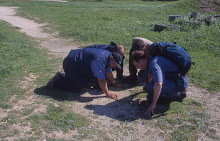It is often said that ProtoIndoEuropean was reconstructed by comparing the existing language. This is not completely true. Reconstruction of the PIE is based on the hypothesis that PIE contained all the phonemes present in the many branches of the language family (with minor variation) and that each nrabch arose by losing part of the phonemes, which is possible but ithat is difficult to distinguish from the alternative hypothesi that the original set of phonemes was reduced and that the different branches arose by consistent shift in phonemes. This is particularly important sicen the PIE was reconstructed long before the discovery of Hittite, which is quite unlike in grammar and phonology from reconstructe PIE. If you look at a table of words in different Indo European languages you see that Hittite is consistently more similar to Sanskrit and secondarily to Greek For instance PIE *dʰugH₂-tér Greek tʰugátēr Hittite túwatara. IThis is consistent with the grammar off Hittite, which is very similar to the more archaic forms of greek. For instance the conjucationof verb closely matches the athematic conjugation of Greek and Sanskrit, which is more archaic; reconstructe PIE grammar instead is based on the more recent thematic conjugation.
This has profounf implications, since it does not mean that PIE did not exist, but that instead of representing the protolanguage it represented an intermediate form between the oldest languages (Hreek Hittite and Sanskirt) and the more recent ones. The study of PIE leads to the conclusion that it was spoken in Ukraine, if instead Greek Sanskrit and Hyitte are the oldest languages the most probable location is somewhere near Kurdistan, where an archaic form of Indo-Arian language is spoken. One of the main arguments fro the Ukarine location is the presence of the word for horse among PIE roots, but such word is not present inHittite.
Of course it is equally possible that the XIX century ideas about PIE are true, that it arose in Ukraine, and that Hittite is somehow a branch of Indo-Arian language with a large number of loans from semitic languages of Anatolia, but I am unconvinced.
Iscriviti a:
Commenti sul post (Atom)

Nessun commento:
Posta un commento